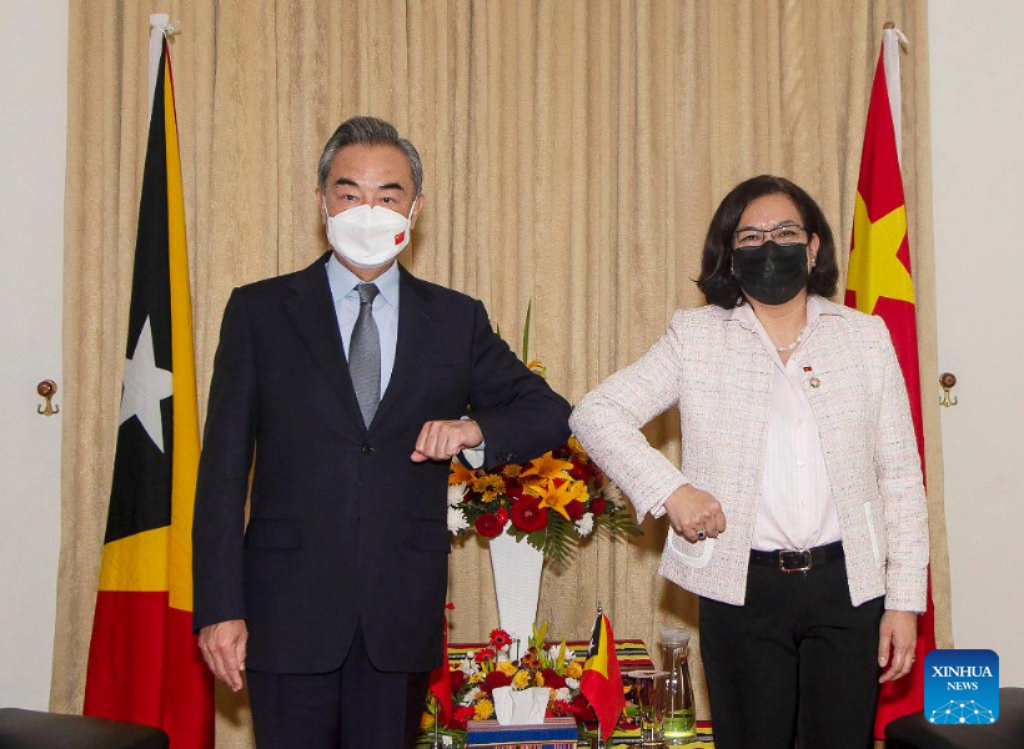
Visiting Chinese State Councilor and Foreign Minister Wang Yi (L) holds talks with Timor-Leste's Minister of Foreign Affairs and Cooperation Adaljiza Magno in Dili, Timor-Leste, June 3, 2022. (Photo by Veri Sanovri/Xinhua)
DILI, June 4 (Xinhua) -- Visiting Chinese State Councilor and Foreign Minister Wang Yi on Friday held talks with Timor-Leste's Minister of Foreign Affairs and Cooperation Adaljiza Magno, with both sides agreeing to strengthen mutually beneficial cooperation.
Noting that this year marks the 20th anniversary of Timor-Leste's independence and the establishment of diplomatic ties between China and Timor-Leste, Wang said the two sides have supported and trusted each other over the past 20 years with steady development of bilateral relations and deepening practical cooperation.
China appreciates that Timor-Leste truly abides by the consensus reached when the two countries established diplomatic ties, firmly adheres to the one-China policy, and understands and supports China safeguarding its core interests, Wang said, adding that China stands ready to work with Timor-Leste to enrich bilateral relations and make their ties a model of mutual respect, equality, mutual benefit and common development between countries regardless of size.
Wang said that the "one network", "one expressway" and "one port" projects in Timor-Leste jointly built by the two sides have become a benchmark for practical cooperation, which greatly alleviated the power shortage in Timor-Leste and promoted infrastructure construction and connectivity, consolidating the foundation of economic development in the country.
Bilateral trade volume nearly doubled last year, Wang said, noting that Timor coffee having become an online best-selling product in China fully demonstrates the resilience and potential of bilateral cooperation.
In fighting the COVID-19 pandemic, China was the first to provide vaccines and anti-epidemic supplies to Timor-Leste, Wang said, adding that China will continue to do its best to help Timor-Leste improve health and well-being of its people according to its needs.
For her part, Magno said Timor-Leste and China enjoy a long history of friendship and the practical cooperation between the two countries is fruitful.
She thanked China's long time and enormous help in her country's fight for independence, construction of the country and security maintenance. Timor-Leste will continue to adhere to the one-China principle, the cornerstone of developing bilateral relations, and strengthen mutually beneficial and win-win cooperation to achieve diversified development.
The two sides will start consultations, at an appropriate time, on the text of a cooperation plan for the joint construction of the Belt and Road, and establish a consultation mechanism at the deputy foreign minister level.
The two sides are willing to strengthen the synergy of development strategies, deepen mutually beneficial cooperation in key areas including infrastructure, energy production capacity, poverty alleviation, education and health, help Timor-Leste boost its capability of self-development, and improve the well-being of its people.
Both sides hope to continue cooperation on hybrid rice and the Juncao technology and to build agricultural hi-tech development zones to help Timor-Leste secure food self-reliance and speed up its agricultural modernization process.
They also hope to explore the whole-industry-chain cooperation in fishery to create more jobs and increase tax revenue for Timor-Leste.
Wang said China supports Timor-Leste in playing a greater role in regional affairs and its bid to join the World Trade Organization, where China is willing to share its experience with Timor-Leste.
China expects to see Timor-Leste's continued active participation in the Forum for Economic and Trade Cooperation Between China and Portuguese-Speaking Countries, Wang noted.
The two sides agreed on championing multilateralism. Wang said China will work with Timor-Leste and other developing countries to uphold the core role of the United Nations and the international order underpinned by international law, oppose unilateralism and bullying, Cold War mentality and bloc politics, and safeguard regional peace and stability, especially to prevent the chaos outside the region from happening in this region.
While talking about the reform of the United Nations Security Council, Wang stressed that China believes that such reform should first increase the representation and say of developing countries and give more opportunities to small and medium-sized countries to participate in the decision-making.
Following the meeting, the two foreign ministers attended a signing ceremony of cooperation documents on economy and technology, digital television, healthcare and others.
They also attended the inauguration ceremonies of a Confucius Classroom in the Institute of Business and a football stadium. ■



